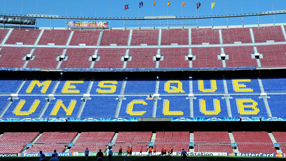
Dwindling revenue from advertising and sponsorship, declining stadium attendances and a slowdown in consumer spending are threatening to tip more clubs into administration as they struggle to meet soaring transfer fees and wage bills.
Real Madrid and Barcelona, the wealthiest and third richest clubs in the world with television and sponsorship deals worth hundreds of millions of euros, are largely insulated from the financial crisis, analysts and officials say.
But lower down the league at least six clubs including second-tier sides Real Sociedad, Celta Vigo and Levante, are in administration and more may follow as the recession takes hold.
"The financial situation of many of the clubs is critical," said Angel Barajas, an expert on the finances of Spanish soccer clubs at the University of Vigo.
"I am really afraid about football because the situation is not sustainable in the medium term."
The figures make grim reading.
Spain's professional soccer clubs have a combined debt of 607 million euros ($766.3 million) to the tax authorities alone, the government said in July.
The best features, fun and footballing quizzes, straight to your inbox every week.
On top of that comes cash owed to the social security system as well as other debts to the public purse, the volume of which the government said it was not allowed to divulge.
According to an estimate in the Spanish media, the combined debt of Spanish clubs is about 3 billion euros ($3.8 billion), compared with some 3 billion pounds ($4.51 billion) in the English Premier League.
VERY WORRIED
Javier Tebas, a vice president of the Spanish football league (LFP), declined to put a figure on the total debt of Spanish clubs but said he was "very worried" about the financial situation, especially in the second division.
Tebas predicted income from advertising and sponsorship would be most affected by the recession and estimated a drop in revenue of 10-15 percent.
"The situation is worse than last year. It's more difficult to find sponsors and much more difficult to find companies who will advertise on TV," he said in an interview.
"The ones most at risk from the crisis are the small and mid-sized clubs," he added.
"Their income is going to be significantly reduced. I don't see the big clubs being affected so much as there are always important companies that want to use them to drive their advertising campaigns."
Some clubs have tried to generate cash by selling real estate but the collapse of Spain's housing market and the woes of the construction sector are choking off that source of funding, according to Barajas at Vigo University.
He also noted that rules on voluntary insolvency can be quite convenient for soccer clubs as officials are able to retain control as long as they present a business plan acceptable to court-appointed administrators.
However, the government has been irritated by the actions of some club officials, who it accuses of abusing insolvency legislation
 Join The Club
Join The Club





